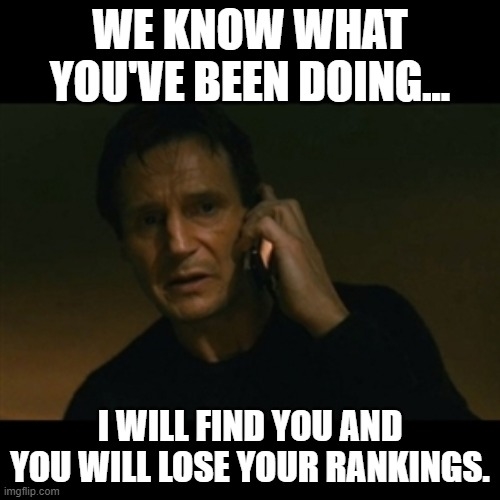Why Google E-A-T Should Matter to Everyone
No, Google is not looking to start eating people, at least not publicly.

Sorry. Where was I? Oh yeah, Google E-A-T. Google added E-A-T to its search quality guidelines in 2014. E-A-T stands for…
- Expertise
- Authoritativeness
- Trustworthiness
Since then there has been lots of speculation as to whether E-A-T is part of Google’s search algorithm or is influencing it in some way. The short answer is “sort of but not really, well kinda, it depends.”
For more on the nitty-gritty of E-A-T, I highly recommend you read recent Wellspring Digital Chat guest Lily Ray’s breakdown of what E-A-T is and what it is not over at the Search Engine Journal.
I don’t want to pontificate over whether or not it is or isn’t part of their algorithm. And this is not a post about technical SEO. That is a separate and equally important subject.
What I want to talk about is the journey Google has taken, where it is going, and why we should follow a similar path.
It’s the UX Bro
UX or user experience is an over-used and bastardized term that has lost its meaning and luster over the years. That said, it is still hugely, bigly even, important if you focus on its true meaning.
I won’t get off on a UX preach tangent. I’m simply saying that we need to focus more on the user’s experience. When it comes to website UX, my friend Joe Natoli from GiveGoodUX.com gave me this UX definition that I think helps me make my point…
“UX isn’t just about users; it’s really a value loop in three parts: The person using the website has to perceive that it’s valuable to them. That perception has to be validated through use. Proof equals trust, which means they use and/or purchase. When both things happen, value comes back to the business/creator in increased market share, customer loyalty, money made or money saved.”
So, what does this have to do with Google E-A-T? I promise this will all make sense in a bit, hang in there.
Google and User Experience
Think about Google’s business model. They live and die by user experience. Every update they’ve rolled out has, in some way, been about the user experience of their search engine. It’s the value loop that Joe talked about.
Why do people keep using Google? Because it works and it works well.
Google Updates – A Ridiculously Brief History
For example, in 2011 they came out with the Panda update. This update came down hard on websites that were trying to game the system by churning out thin, poor quality content. If the sole purpose of your site was to get rankings, your days were numbered.
Then in 2012, they unleashed the angry Penguin. This update punished sites that were using poor quality links to build their visibility. They shifted focus, instead, to rewarding websites with quality backlinks. In other words, no more buying crap links.
You have to build links the old-fashioned way, you earn them.

Over the following few years, they rolled out other updates that focused on how information was displayed in the search results. The SERPs (search engine results pages) stopped being just a list of links and started showing maps, snippets, and even giving search results for voice searches. We could go down the whole NLP (natural language processing) rabbit hole but I will fight the urge.
There were other updates like these, mostly focusing on improving the quality of the results displayed. They also decided that every website needed to have an SSL, meaning it was secure.
And they said you better have a mobile version of your website and your website better be fast. I am really speeding past the last 9 years of updates (see what I did there?). What’s my point?
Google Is Trying to Tell You Something
Over these past 9 years, Google has rolled out updates and search quality guidelines that focus on giving you a better experience when using their service. They told you to build good useful websites…
- Produce content that answers questions and solves problems, even if that problem is needing to know the cast of Hamilton.
- Build fast responsive websites that are secure and easy to use.
- Create content that helps people find things locally.
- Use things like schema markup making it easy for Google to show the user things like instructions, maps, or tools.
- Build links by being a valued website that other valued websites will link to.
- Stop trying to game the system. You can get away with it for a while but eventually, you’ll get a call from Liam Neeson about finding you and taking your rankings away.

Google wants you to provide value. They will then pass that value along to their users. If you do not provide value, you will struggle to get rankings. Sure, some crappy websites still rank. But, they all lose out at some point.
So, what is Google trying to tell you with E-A-T? Well, let’s look closer at their search quality guidelines.
Search Quality Guidelines and Google E-A-T
So, you may not know this, but Google employs thousands of people to do searches and evaluate the results against a set of rating guidelines. Basically, these people are tasked with making sure the algorithms are working well.
Now, many will say that these guidelines, which you can read here, do not affect the rankings directly, which to a certain extent is true. But, according to Dr. Marie Haynes in this interview [Youtube], Google has been incorporating elements of their search quality guidelines into algorithm updates since 2017.
According to our friend Lily Ray, in her recent SEJ article, “in the current version of the Quality Guidelines, E-A-T is mentioned 135 times in 167 pages.”
So, Google is saying that expertise, authoritativeness, and trustworthiness are all important when considering whether the results given are quality.
E-A-T Should Influence Your Digital Marketing Efforts
Let’s break that down into simple terms. People want search results with links to information from experts, with authority, who they can trust. So what does that tell us?
It tells me that we need to stop churning out crap content. We need to stop trying to game the system. We need to put our experts front and center and start giving people the information they can trust and can use.
Yes, we still need to “market.” We still need to advertise. People still want fun and they want to be entertained. And design still matters.
But, in this era of “fake news” and misinformation, people want to be able to believe the information they read online, even if it’s just an article about whether or not Brad and Angelina are really getting along.

Source: https://www.cinemablend.com
I mean, think about the kids, guys. They need mommy and daddy to be on the same page here!
Sorry. Anyway, my point is that E-A-T matters across all platforms. Google is telling you to take your marketing seriously and stop putting junk out there. And, according to Dr. Haynes, this is only going to continue.
What Does This Mean for Marketers?
I’m glad you’ve decided to make it this far on our little E-A-T journey. This stuff, while boring to many, really matters. Our marketing can live and die by our Google rankings.
But, it’s more than that. In today’s world, our marketing efforts and even our business efforts can all depend on whether people believe and trust us.
In another Wellspring Digital Chat, Sarah Weise, UX expert and author of Instabrain, talks about how Gen Z will find something interesting and then do a serious deep-dive. They want to find out everything they can about that one thing.
Google is doing that same deep dive. And as fake news and other false information permeate our media sources, more and more people are going to do their research to find the truth.
Are you ready for that? What happens if someone does a deep dive on you?
- Is your website in good shape?
- Do you have deep-dive content?
- Does your content meet the E-A-T standards?
- What about your social media? Is there a real there, there?
It’s time to take your marketing seriously. We are well beyond the days of marketing being about the sizzle. People want to know more about the steak. Where did it come from? Was the cow happy? Did it live a good life? Did someone read to it at night?
You get my point. It’s time to dial in your marketing and get your company ready for that deep dive. It’s coming. It’s already here!
Are you ready? We can certainly help. Drop us a line or give us a call at 717.457.0522.
(The jokes in this post are solely meant for my Gen X brethren. No millennials or Gen Zers were harmed in the writing of this post.)
Digital & Social Articles on Business 2 Community
(79)


